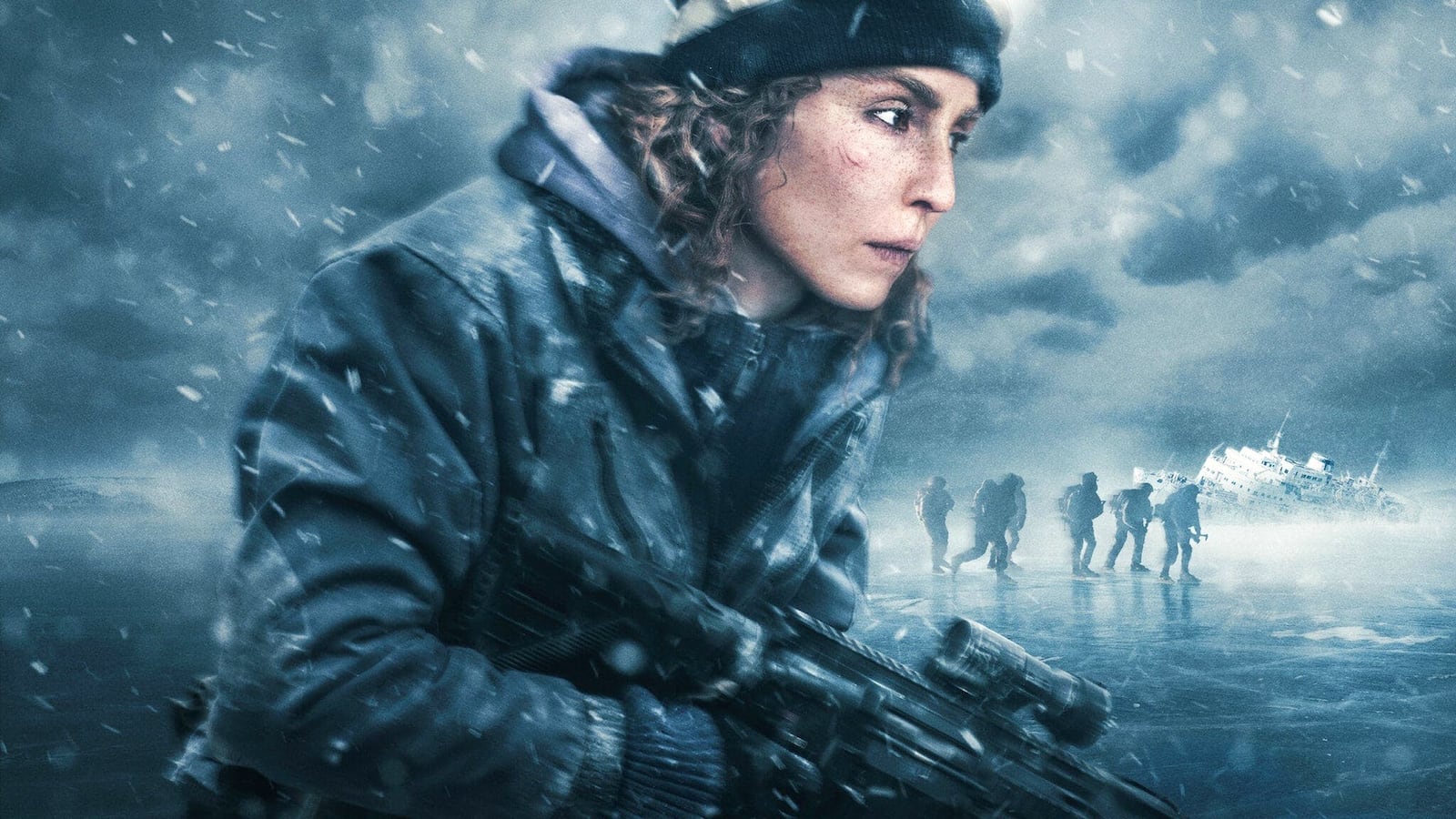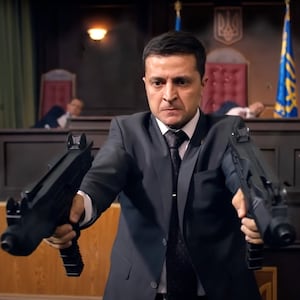The best B-movies don’t just deliver over-the-top genre pleasures but marry those outrageous thrills to bold, sharp thematic concerns. Black Crab, unfortunately, only does the former, establishing a nifty premise and then doing very little with it other than to go through the post-apocalyptic action-adventure motions. Noomi Rapace once again acquits herself nicely in a gung-ho effort, but her steely performance isn’t enough to truly elevate this Netflix import about one woman’s daring mission to cross an ocean of frozen ice to stave off disaster—and, just as crucially, to reunite with the person she loves most.
Adapted from Jerker Virdborg’s novel, Swedish director Adam Berg’s feature debut is a chilly affair that opens in an unspecified time, with Caroline Edh (Rapace) and her daughter Vanja (Stella Marcimain Klintberg) sitting in traffic in a city tunnel. Radio reports about a civil war that’s killed more than 150 are unnerving enough to compel Edh to change the station. Alas, their respite from that conflict is woefully brief, as gunshots suddenly ring out, people begin fleeing past their vehicle, and they hurriedly take cover beneath a blanket in the backseat. This hiding spot is insufficient for the situation at hand, though, and moments later a masked gunman breaks through their window, dragging one of them away while the other screams in terrified despair.
Cut to another unidentified future, and Edh is dropped off by train at a military outpost in what’s clearly a warzone, marked by scores of vagabond refugees herded behind barbed-wire fences in makeshift tent cities, and columns of smoke lining the horizon. Things have clearly gone to hell in a handbasket, but Black Crab provides no details on what’s actually taken place—a tack that it’ll continue, to increasingly frustrating ends, as it lays out its scenario. Edh is a member of whatever army is stationed here, and after receiving papers from a commander, she’s sent with Lieutenant Nylund (Jakob Oftebro) to visit a nearby base. That trip goes south quickly, with Nylund abandoning Edh at a pitstop, thereby forcing her to fend off a horde of desperate homeless attackers and commandeer his vehicle in order to reach her destination, where she’s lumped in with a group of recruits that include gruff Malik (Dar Salim), young Granvik (Erik Enge), and shaken Karimi (Ardalan Esmaili).
Black Crab immediately establishes Edh’s ass-kicking bona fides, yet not where she might have procured them. Then again, the film tells us literally nothing of note about Edh other than that she loves Vanja, is distraught over being separated from her, and wants to locate her no matter the cost. Intermittent flashbacks further elucidate their bond, or at least strain to; the brief glimpses we’re offered of mother and daughter are so skimpy and unilluminating, they suggest that additional backstory snippets were left on the cutting room floor. As it stands, Edh is a grim, no-nonsense scowler, and it’s a testament to Rapace’s rugged charisma that she makes Edh a compelling center of attention despite the fact that she’s been conceived as an action figure rather than a nuanced protagonist
Similar things can be said about Black Crab. Berg and co-writer Pelle Rådström offer few details at the outset about the nature of this global conflict, which has left Sweden a smoldering ruin and its people a destitute bunch living in the streets, pining for their missing relatives, and fearful that they’ll wind up like a trio of men Edh sees hanging from an overpass decorated with the word “Deserter.” Which side is Edh on in this clash? Who are her enemies? How and why has everything gotten to this calamitous point? Anyone seeking answers to such basic questions will go unfulfilled during this saga, which soon finds Edh and her comrades embarking on a perilous assignment: transport two vital canisters to a distant outpost by skating under cover of night across miles and miles of frozen ocean ice.
That’s a good, clever hook, and director Berg drums up significant suspense from sequences of characters gliding across this chilly landscape, the sounds of their skates in the cool, frosty night only accompanied by a low, menacing synth-heavy score. Images of these individuals skimming through the dark in silhouette, backlit by fiery conflagrations or the glow of the moon, set a suitably tense mood. So too does a later perilous encounter with a spotlight-utilizing helicopter, as well as the discovery of victims of a sunken boat, all of them frozen in the ice. From a formal standpoint, Black Crab is polished and evocative, and exhibits the same sort of all-business efficiency that typifies Edh, whose motivation for embarking on this quest is the promise that, at the end of the road, her daughter will be waiting for her.
Given the mysteriousness of everything and everyone in Black Crab, it’s less than wholly believable that Edh thinks Vanja is really alive; certainly, audiences will instinctively cast a skeptical eye at the deal offered to her, and be less than stunned by the revelations that Berg and Pelle Rådström have in store. More frustrating than that predictability, however, is the general emptiness of these proceedings. Edh is a figure of unstoppable maternal devotion, but a rather standard-issue one; and moreover, that’s about all that the film has to offer in terms of a larger point. While stripping a futuristic tale down to its essence can sometimes be a means of generating abstract-ish excitement, in this case, the refusal to dispense intriguing or complicating details about the bigger contextual picture—save for a scattered morsel or two about Malik and Karim—renders things hollow, incapable of saying anything about anything other than that motherly love is a force to be reckoned with.
Consequently, Black Crab proves a stylish exercise whose plot never lives up to its aesthetics. And yet even so, there are far worse things than a genre programmer that knows how to get its down-and-dirty job done with flair and skill—even if that job, in the end, turns out to be less audacious than it initially appeared.







